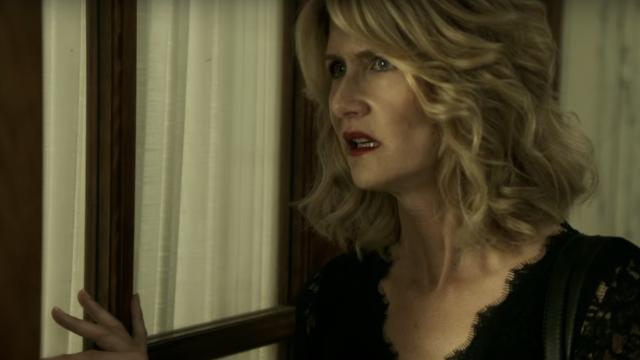Movies often tackle issues of memory and subjective point-of-view, but few make it feel as natural, thoughtful, and emotionally raw as Jennifer Fox’s autobiographical film The Tale. It has an analytical approach that, with another film, would risk dampening the impact; The Tale makes it natural because it’s Jennifer’s pain handled Jennifer’s way, and director Jennifer Fox convinces us that character Jennifer Fox (Laura Dern) would treat her trauma like this, parsing it as a tangled mess of history, biography, and psychology. She’s a documentary filmmaker who knows how to find sources, how to research, and how to conduct interviews. She uses the tools she has.
Jennifer’s investigation into her past starts when she gets a phone call from her mother (Ellen Burstyn). Nettie Fox just unearthed an old school assignment of Jennifer’s, and she’s frantic–and Jennifer, in a key detail, is screening her calls, reluctant to deal with this. When she talks about it to her fiancé, Martin (Common), she blows it off: she wrote about her first boyfriend, and she hadn’t told her mom about it because he was older. That’s all.
She was thirteen. The “boyfriend,” Bill, was in his mid-forties.
Bill (Jason Ritter) is good-looking, clean-cut. Charismatic in a slightly cheesy way. He’s a running coach, and Jenny meets him because he works with her riding instructor, the glamorously aloof Mrs. G (Elizabeth Debicki), who takes Jenny and two other girls on as live-in students during the summer. Mrs. G says running will help give them the strength and stamina they’ll need for riding. Both Bill and Mrs. G say a lot of things, like how important it is to embrace pain and how Jenny is an old soul. And such a beautiful girl.
Adult Jennifer spent years ignoring what happened to her, but now she’d uncovering it–how carefully she was selected, groomed, and manipulated, how thoroughly she was violated, how, without even knowing it, she had her views of love and sex warped before she was even old enough to experience them naturally. The psychological suspense and investigation of The Tale is extremely well-done; there are unsettling and unsolvable suggestions of complicity or knowledge, before or after the fact, and there’s the uncertainty of how much responsibility various parties bear for what happened. In a way, the most gut-wrenching present-day interview is with a finally-directly-confronted Mrs. G (now played by Frances Conroy), whose willingness to reminisce evaporates once she realizes why Jennifer is really here. When Jennifer is pleading with her for some answers, any answers, and Mrs. G just keeps offering her a map and telling her how to find her way off the farm, not even acknowledging what she’s saying, it’s brutal.
But the most brutal part of The Tale is how it handles the subjectivity of Jennifer’s memories. It’s always clever, and almost always emotionally affecting and thought-provoking–and there are particular touches that hit like a sledgehammer. One of the earliest and best comes when Jennifer digs through her family albums, searching for pictures of herself at that age. She finds a youthful, vivacious, post-pubescent girl, the kind you could feasibly believe could have a story of her first love–even if the story should go differently. We’ve already seen this young actress in Jennifer’s memories: this vibrant girl in on the jokes, instantly gravitating towards Bill and Mrs. G.
Then her mom says no. That’s a photo from two years later, when she was fifteen. This is Jenny at thirteen (Isabelle Nélisse). And Jennifer sucks in a breath as everything comes crashing down, because it’s impossible to look at her at that age and see anything other than a child–and a devastatingly shy and awkward one, at that. The memories replay, this time with Nélisse slotted in, heartbreakingly small and skittish, not even remotely ready for what the adults around her are planning. It’s a painful, dramatic moment for adult Jennifer and a nauseating, revelatory, and well-handled bit of cinematic technique. That’s The Tale in a nutshell.
The Tale is streaming on HBO Max.

